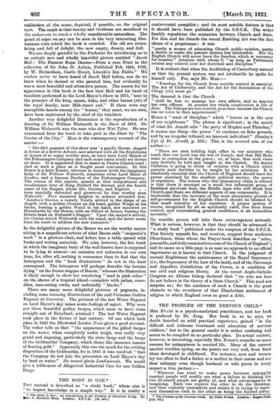THE BODY IS ONE.*
This manual is described as "a study book," whose aim is " to impart knowledge in a simple way." It is in reality a • The Body is One: an introduction to the Problem of Christian Unity. By Ser. C. Beaufort Moss. Loudon : net.] controversial -pamphlet ; and its most _Potable feature is 'that
it should have been published by the - The writer frankly repudiates the connexion between Church and State. For him and his friends the recent Enabling Act was the first clause of a programme : it was
"partly a means of educating Church public. opinion. -partly a device to-make the present system less intolerable. But the English Church will never have the freedom which is necessary for-reunion " [reunion- with whom f] " as long as Parliament retains any control over her doctrines and discipline."
It is evident,that when the Archbishop of Canterbury assured us that the present system was not intolerable he spoke for himself only. For, says ,Mr. Moss :-- " Freedom for the Church from outside control -is essential. The Act of Uniformity, and the Aot for the Submission of the Clergy [sic] must go."
The demand is that the Church
" shall -be free to -manage her own affairs, and to -appoint her, own officers. At present her whole constitution is out of date. The bishops are not trusted, as a class, because the Church has no voice in their appointment."
Hence a " want of discipline " which " lowers us in the eyes of our neighbours." The phrase is significant ; in the mouth of what Dr. Arnold calls " the party of Hoplrni and Phinehas," it means one thing—the power " to condemn on false grounds, and by an irregular tribunal, an innocent individual." (Stanley's Life of Dr. Arnold, p. 353.) This is the avowed aim of our author :- "There are men holding high office in our ministry who teach that our Lord was the son of Joseph, and that His Body went te•eorruption in the grave ; or, at least, that such views may lawfully be held and taught in the Church. No. decent Christian is going to think of reunion with a Church which permits such doctrine to be taught by her ministers. It is absolutely essential that the Church of England should have the power exercised by the smallest political society, the power of expulsion. The reason why this elementary claim is refused is that there is amongst us a small but influential group of fossilized survivehi from the Middle Ages who still think that Churchauni-State are different aspects of one community. It is intolerable that the recovery of the most elementary powers of self-government for the English Church should be blocked by that small minority of her members. A proper system of courts, recognized by all as spiritually valid, free from State control, and commanding general confidence, is an immediate necessity."
No sensible person will take these extravagances seriously. What is serious, however, is that they should be advanced in " a study book " published under the auspices of the S.P.C.K. This Society appeals for, and receives, support from moderate Churchmen, those whom the Prayer-book describes as "sober, peaceable, and truly conscientious sons of the Church of England"; and its name on a title-page is as near an approach to an official imprimatur as is known in that Church. In the judgment of normal Englishmen the maintenance of the Royal Supremacy (-i.e., the Supremacy of the Law of the land), and of the Patronage and Appellate Jurisdiction of the Crown, is a condition of our civil and religious liberty. At the recent Anglo-Catholic Congress an African bishop declared that " we who are here do not believe in the theory of a State Church." This need not surprise us ; for the existence of such a Church is the great obstacle to the overthrow of that Elizabethan settlement of religion to which England owes so great a debt.


































 Previous page
Previous page